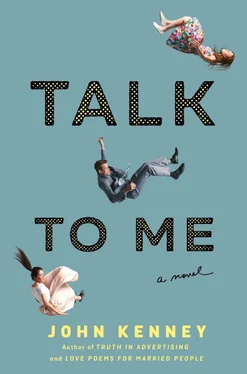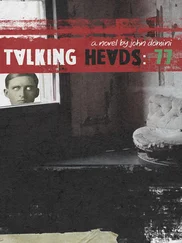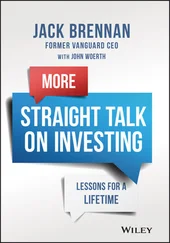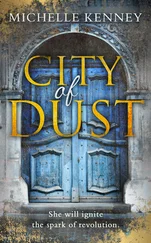It’s fine , Claire had said. She’s nineteen .
He watched Claire go about making the meal. Peeling the shrimp, pressing the garlic, chopping the parsley. She did it with such care and attention to detail. Children never saw that. You got no credit for the invisible work of parenting. The late nights. The 3:00 a.m. pee when you checked on them, made sure they hadn’t fallen out of bed, that their blanket was still on, that the temperature of the room was just right. Crusts cut off sandwiches.
He watched her and looked at his watch and sipped his wine and found himself getting angry. Angry at Claire for trying so hard. Angry at himself for not trying hard enough.
At 7:30, Claire called Franny’s cell. It went straight to voicemail. She tried again twenty minutes later. Same thing. Claire put her phone down and moved the saucepan with the shrimp sauce in it, slamming the pan. Her back was to Ted and she stood looking out the kitchen window, a pose Ted had seen a hundred times.
“It’s ruined,” she said.
She turned and walked to the door, grabbing a fleece. She needed to walk in the garden. She needed the cool air. She needed to see her plants, to whom she gave so much care and attention, who flourished, who seemed, in their quiet way, to appreciate it.
Franny walked in a little before 9:00.
Claire and Ted were in the kitchen.
It was Claire who reacted first. Ted remembered that.
“Where have you been?” she shouted.
“I lost track of time, I’m sorry.”
Claire looked at Franny’s bloodshot eyes. “Are you stoned? Is that why you’re late?”
Ted took a few steps to get a closer look. Franny put her hands up, pulled a mock-surprise face. “Whoa, Ted. Calm down.” She smirked. Or maybe she was smiling. It seemed like a smirk. Like she was taunting him.
It happened so fast. He didn’t plan it. He’d never done anything like it before. He slapped her, hard, across the face. The sound. A rifle crack. Ted wasn’t sure which happened first but he thought it was Claire screaming.
“Ted!”
Franny’s mouth, falling open, the pain of it, tears popping out, rolling down her cheeks. Her expression like a child, the surprise of it. The how-could-you of it. The instant regret on Ted’s part.
And then the explosion from Franny.
“Fuck you!”
And she was gone.
• • •
Ted sipped his coffee. Franny looked at her notes. She checked her phone.
“Why did you decide to get into news? Your father worked on railroads.”
Your father. Not my grandfather .
“I needed a major in college. Seemed like a good idea.”
“No… influences or mentors?”
How could she not know this?
“My uncle worked in radio. A station in Providence. Read wire service reports, weather, sports scores. We’d hear him. He’d come over for Sunday dinner sometimes and I thought it was like Frank Sinatra visiting.”
A half smile from Ted at the memory of it.
“He brought me into the studio once. I thought it was pretty cool. This is Laurence Grayson for WPRI radio news. ”
Ted sipped his coffee and looked out the window. “I remember it very clearly because it was summer and I was home and my mother had the radio on… He was the one who announced… the first I heard of it, I mean… that President Nixon had resigned. It was an amazing thing. A relative of mine, this man who’d been to our house, who I knew, was saying these words that tens of thousands of people were hearing and would change their lives. It seemed important. August 9, 1974. A Thursday.”
Her head was cocked to one side, her mouth open a bit. She looked six.
“You went to the University of Rhode Island,” Franny said.
“Yes.”
“You played football.”
“Yes.”
“Quarterback.”
“Yes.”
“Second-team All-American.”
Ted snorted what he thought was a self-deprecating laugh at the recitation of the Wikipedia facts from his daughter, at the second-team All-American line. Franny assumed that he was laughing at her.
“What’s funny?” she demanded.
Ted put his hands up, a gesture of peace but to Franny false and melodramatic.
“Hey. I was laughing at the thought of me as a second-team All-American. From Rhode Island. It wasn’t that impressive.”
Franny was looking at Ted’s eyes, the caramel brown, the shape, his long eyelashes. They were the same. They had the same eyes. This bothered her.
Her phone buzzed and she reached for it immediately.
“The Post got hold of internal numbers on Bryce Ringling,” she said to her screen.
Ted said nothing.
“They’re… good,” she said, still reading.
“Oh.”
“They beat yours.”
Ted nodded.
She watched him get up out of the chair and wince.
“What’s wrong?”
“Nothing. Just old.”
She watched him walk to the kitchen and take the pot from the Breville coffee maker and walk back and fill her cup, then fill his cup, then walk back to the kitchen. He didn’t look at her, in the way you don’t need to look at a family member, someone you know so well, have been around so often, physical proximity a given. He was wearing a powder-blue dress shirt and he had hair on the back of his hands and a tiny scar near his eye from when his sister threw a shoehorn at him. He smelled of bay rum. It was the safest smell she knew.
Ted stood by the window.
“Do you mind?” he asked, his back to her. “It’s easier on my back if I stand.”
She craned her head around, looked at his back. “No.”
She was about to check her notes but her phone buzzed. Something about the noise, the relentlessness, bothered Ted. He knew it was about him and he knew it was bad. He turned and watched her hold her phone, inches from her face. It was a kind of mother’s milk, this thing. The answer to all of life’s questions. It was life, itself.
“The Columbia interview is trending.”
He turned and stared out the window at Columbus Circle. The vendors, the hot dog carts and pretzel carts and cheap T-shirt vendors, the tourists on bicycles and the weird guys on Rollerblades and the buildings along Central Park South. The Essex House sign. There was a man walking a dog. No one paid any attention to the man. Ted wanted to be that man.
The double-pane windows kept most of the street noise out. Thick carpet. The tick of a ship’s clock on the wall, a present from Claire. The coffee machine in the kitchen occasionally hissed steam, like it was exhaling.
Her phone pinged over and over. Each ping was a paper cut.
“Playing squash?” he asked the window.
Her initial reaction was to lie. She wasn’t sure why. She felt she should be playing squash, living a cleaner life. But she wasn’t and she felt guilty about that. But her guilt annoyed her. Why can’t she not play squash? He had been so proud of her when she was younger, the promise she’d shown, the day she beat Claire when she was only fourteen.
“No.”
She was looking straight ahead, at a painting Claire had bought years ago in Provincetown, at one of the art galleries on Commercial Street. A lone cottage on a steep dune, a winding road going off in the distance. It looked wonderful to Franny, a place to escape to, a place she wished she could step into.
“Why not?” Ted asked.
“I don’t know,” she answered too quickly. “Life. Work. Stuff.” None of that was true. There was plenty of time. She smoked too much, drank too much, stayed up too late. She did things she didn’t really want to do and wasn’t sure why. Things that, as she was doing them, she questioned, looking at herself from a distance. The “Why not?” had a cascading effect on her. Why not, indeed? Why not play more squash, go to bed earlier, live healthier, leave scheisse , go to Vox, go somewhere better, start her own place, return to the blog she’d started and stopped? Why not meet nicer men? Why not stop hooking up? Why not treat herself better?
Читать дальше












